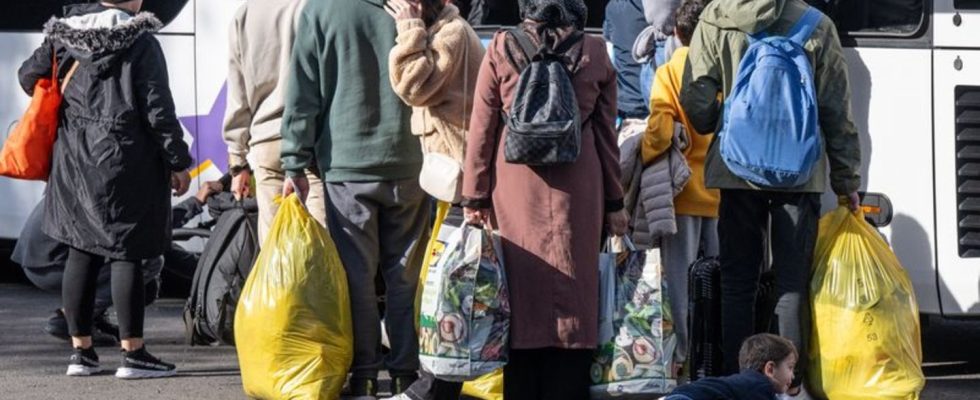Migration is likely to be the top topic in Chancellor Scholz’s negotiations with the heads of government of the federal states. The expectations are great.
When it comes to migration, the states enter into negotiations with the federal government with high financial expectations and the demand for permanent regulations. Lower Saxony’s Prime Minister Stephan Weil called for a national consensus on the issue of migration before the federal-state round. This would be an important sign for citizens of a shared perception of responsibility, said the SPD politician at the request of the German Press Agency in Hanover.
This Monday, the heads of government of the 16 federal states will meet in Berlin, and in the afternoon the discussions will continue in the Chancellery together with Chancellor Olaf Scholz (SPD). In addition to the topic of migration, the agenda of the Prime Minister’s Conference includes, among other things, further financing of the Germany Ticket, the acceleration of planning and approval processes and hospital reform.
The refugee issue is considered particularly sensitive. This is about sharing the costs, reducing the number of refugees and returning rejected asylum seekers to their home countries more quickly. The states and with them the municipalities expect the federal government to contribute significantly more to the financing than previously planned.
According to their information, the federal government wants to reduce its share from 3.75 billion euros this year to 1.25 billion euros next year. The countries don’t want to accept that. In a resolution in mid-October, they demanded a flat rate of 1.25 billion euros and at least 10,500 euros per migrant.
Scholz expects an agreement on how the costs will be shared
Chancellor Scholz (SPD) was optimistic that there would be an agreement on how the costs would be shared. There is talk of further federal support for the states, he told “Mannheimer Morgen”.
“I am confident that we will also agree on the money issues,” said Scholz. The accommodation and integration of refugees is “a task for the entire state”. It is also about speeding up asylum procedures and returning rejected asylum seekers more quickly. “At the moment too many people are coming to Germany irregularly,” Scholz told the newspaper.
Warning of consequences of failure
Saxony-Anhalt’s Prime Minister Reiner Haseloff (CDU) told the German Press Agency: “The federal government is responsible for securing the external borders. It cannot be the case that the federal government only wants to cover a fraction of the costs.” The capacity limits have been reached. Municipalities and states could no longer cope with the constant burden. “Because we don’t control immigration and don’t stop illegal migration, more and more budget resources have to be spent on this area. Many people no longer accept that,” emphasized the CDU politician.
What is now needed is a “real breakthrough,” said Haseloff. “Otherwise we as a state will continue to lose credibility overall. The shift to the right is in full swing. Ultimately, Monday will have a significant impact on Germany’s political future.”
Municipalities at the attack – population unsettled
The Prime Minister of Rhineland-Palatinate, Malu Dreyer (SPD), told the dpa that many municipalities are “at the limit” when it comes to accommodating refugees. “It is also undisputed that the mood among the population is very unsettled.” Dreyer also admitted that the federal government had quickly implemented far-reaching demands from the states in order to limit the numbers. Saarland Prime Minister Anke Rehlinger (SPD) called for “more clarity and order” in German refugee policy. “Anyone who needs our help will get it. To achieve this, the financing must finally be clarified,” she told the dpa.
Countries want a “breathing system” for refugee costs
The Prime Minister of Mecklenburg-Western Pomerania, Manuela Schwesig, told the “Rheinische Post” (Saturday): “If more refugees come to Germany, federal support must increase.” This must be finally agreed on Monday.
North Rhine-Westphalia’s Prime Minister Hendrik Wüst also made this statement. “The most important thing is that we get out of this haggling,” said the CDU politician to “Welt am Sonntag”. One thing is clear: “If more people come to us, then more money has to flow. We finally need the breathing system promised by the Chancellor.”
Municipalities follow the state line
The President of the German Association of Cities, Markus Lewe, demanded in the Funke newspapers that the Chancellor should have “significantly more in his luggage than the previously announced 1.7 billion euros for a per capita flat rate.” The amount for the flat rate must be “at least doubled”. The meeting will only be a complete success “if we finally get a breathing financing system that dynamically adapts to the number of refugees and is already secured in the federal budget for 2024.”
Call for a reduction in the number of asylum seekers
Federal Justice Minister Marco Buschmann (FDP) told “Bild am Sonntag” that the Prime Minister’s Conference must send the signal “that we want to achieve a change in migration together.” Lower Saxony’s Prime Minister Weil also emphasized that the number of people coming to Germany must decrease.
CSU regional group leader Alexander Dobrindt told “Bild am Sonntag”: “Last year there were 240,000 asylum applications, this year there will be over 300,000, plus a million refugees from Ukraine. A look at the situation in our communities shows that in the future there will be a number of 100,000 represents the more likely load limit.”
Criticism of the tone in the migration debate
The Federal Government’s Commissioner for Integration, Reem Alabali-Radovan, complained about the tone of the debate. “A tone that is becoming increasingly sharp and populist, as well as presenting new pseudo-solutions every day, is dividing our society into “The Others” and “We,” the SPD politician told the Editorial Network Germany (RND). It is wrong to blame migration as the cause of all problems in Germany.

